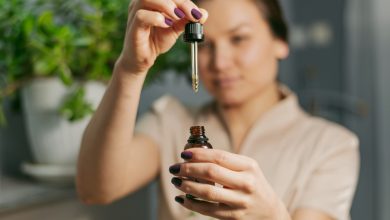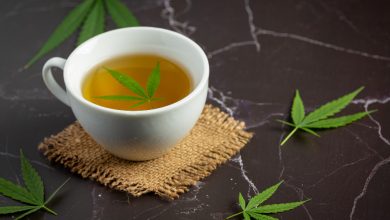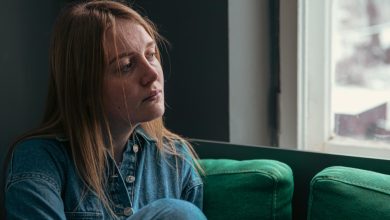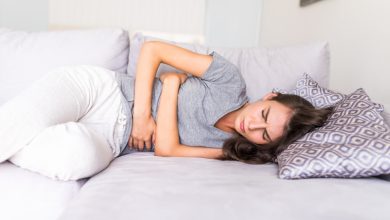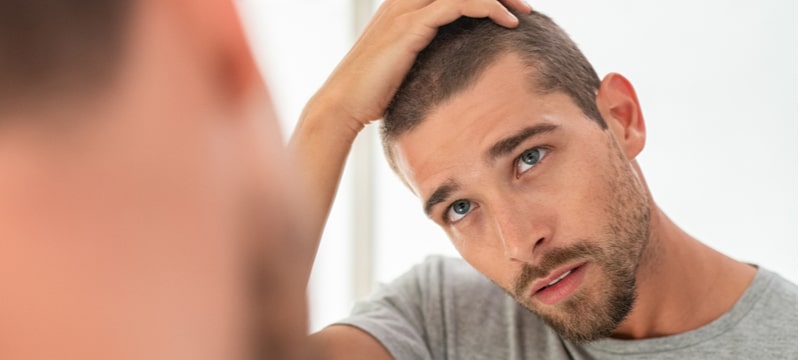
Hair is incredibly important to us as humans. The way it looks and the way we style it can define our heritage, cultural values and personalities. Hair is also a deeply emotional issue – we are usually happier with hair than without it. Hair loss can therefore be very upsetting, and we’ll try almost anything to prevent that from happening. But can CBD oil help with hair growth and prevent hair loss?
CBD oil for hair and its health potential is a hot topic. Fans claim CBD can help with practically anything, from improved sleep to curing serious diseases. But the research to support this is lacking. This has not stopped people making some outrageous claims for CBD, and questionable products to match. However, there is research reporting that certain physical functions concerned with healthy hair growth can be improved with CBD.
Before we dive into the possibilities of CBD, let’s ask why our hair is not always our crowning glory.
Table of Contents
Why do we experience hair loss?
For many people, mainly men, hair loss is a fact of life. Male pattern balding is genetic and causes hair loss at the crown or the temples, where it shows as a receding hairline. There’s very little that can be done about it, other than an expensive transplant. And although the old story says balding is inherited from your mother’s side, your genetics come from your father, too.
Around 50% of men aged 50 have some degree of hair loss. Many take this in their stride but it’s likely most would love to reverse the situation. For some men, balding starts in their teens. They are hardly into adult life when they experience a traumatic loss of hair. This can affect confidence and self-esteem.
Let’s be honest here – as this type of hair loss is determined by genetics, CBD cannot help with regrowth or prevent hair loss. But it may help with other types of hair loss or thinning.
Hair being lost, or thinning, in random patches, could signal alopecia. This is a condition thought to be linked to the immune system, not to standard balding. It can cause dramatic hair loss in both men and women over the whole body.
Other reasons for hair loss include:
- Post pregnancy hair loss due to drops in oestrogen
- Telogen effluvium – hair remains in a shedding phase
- Anagen effluvium – rapid hair loss during the growth phase
- Traction alopecia – caused by constant strain of tight hairstyles
- Medication side effects
- Ringworm – a fungal infection which, if found on the scalp, can cause patchy hair loss
- Poor nutrition – low protein and iron diets
- Birth control for women – hormones can cause hair loss during and after use
It’s different for girls
Women tend to keep a full head of hair for much longer than men. It does, however, often thin out with age, or change texture when it turns grey. But hair loss, or poor hair condition, can affect any age. Overall, there is not a great deal of research on why women suffer hair loss.
Alopecia can afflict women too, and is possibly more traumatic than for men, as hair is such a defining feature. We are used to seeing men with shaved or bald heads, but that’s still a rare sight in women.
Unfortunately, we closely associate a female bald head with cancer. Chemotherapy can result in hair loss across the entire body or cause significant thinning. There are suggestions to prevent this, but many women choose to cut their hair very short before treatment to minimise the impact.
Hormones can also cause changes to hair. Many women say their hair has changed during pregnancy, and particularly during menopause. Hormones also play a role in male pattern balding.
Stress and hair loss
It has long been said that worrying can make your hair fall out. There is an element of truth in this. Studies have shown that stress can affect the hair by sending the follicles into their resting stage. After a while, the hairs fall out and the resting follicles do not stimulate new growth.
https://www.nih.gov/news-events/nih-research-matters/how-stress-causes-hair-loss
Stress caused by chronic illness, pain or depression can affect hair loss. However, this is not always permanent. Once the cause of stress is removed, hair usually grows back. As CBD is believed to reduce stress levels, it could play a role in minimising hair loss. But more on this later.
Skin conditions can affect hair
Human hair is made from strands of a protein called keratin, which also builds our nails. Each hair grows from a follicle embedded in the skin. The skin on our head, known as the scalp, is a separate entity from the hair. But its condition can impact the growth, volume and strength of the hair. Reduced levels of protein in the body have been known to affect hair loss. This suggests that a healthy intake of protein can promote hair growth or regrowth.
When the skin is compromised, or not healthy, hair can be affected. Skin conditions like eczema and psoriasis can cause hair growth to be patchy or weak. As the scalp is still our skin, these conditions can affect hair growth on the head, too.
These conditions can cause the skin to be itchy, red, sore or flaky. The scalp can become inflamed and it is hard for hair to grow in these conditions. Furthermore, scratching these itchy patches can lead to more inflammation, hair breakage and damaged follicles.
What does CBD oil do for hair?
Healthy hair needs a combination of oils and moisture. Hair is made of keratin, a structural protein. To maintain its strength, keratin requires a supply of protein, vitamins and minerals. CBD oil is rich in many of these and can contribute to stronger hair in the following ways:
- Vitamins A, C and E are antioxidants which help protect the body, and hair follicles, from free radicals and external pollutants.
- Vitamin E has known skin-friendly properties, so it can help to nourish a dry scalp.
- Vitamin C helps the body produce collagen, a protein that protects against brittle hair.
- Vitamin C is necessary for iron absorption. Insufficient iron levels in the body can lead to anaemia, which is associated with hair loss.
- Iron and magnesium can promote a healthy blood flow. The skin is the body’s largest organ and needs healthy blood circulation to function well.
In addition to these vitamins and minerals, CBD oil contains essential fatty acids. It’s important to explain that it is not the CBD, or cannabidiol, that contains these, but the hemp oil it is held in. Hemp oil is rich in proteins, minerals and fatty acids. CBD is extracted from the hemp leaves and flowers so CBD oil contains some of this extra goodness.
Hemp seed oil in the diet
If you are looking for a more plentiful (and cheaper) supply, it may be an idea to take hemp seed oil. This oil is produced from the seeds and contains all the nutrients you need for healthy hair but without CBD.
Using hemp seed oil in your cooking, or even on the scalp, increases the intake of vital fatty acids and other nutrients. Remember, you won’t get the effects of CBD acting on the endocannabinoid system.
One particularly good benefit of hemp seed oil is that it provides a balanced ratio of omega-6 to omega-3 fatty acids. The ratio of 3:1 is hard to find elsewhere and supports the reduction of inflammation. We already know how important this is for your scalp.
Benefits of Omega-3 fatty acids
Omega fatty acids come in three groups, but it is predominantly the Omega-3s that can impact hair and skin. The body does not produce its own supply so it must be found from food. Good sources are oily fish, flax seeds and hemp seed oil. Here are some benefits of Omega-3:
Fights inflammation and therefore reduces the redness and swelling of inflamed, irritated skin.
Boosts the immune system, which has been considered as an underlying cause of alopecia.
Great for skin health, regulating oil (sebum) production and hydration.
May reduce hair loss and promote hair growth, although these results come from animal studies only.
How can CBD help prevent hair loss?
CBD, whether taken in the popular oil form, or as capsules or edibles, may have many positive physical effects. Some of these benefits are supported by scientific research but other claims remain anecdotal.
When we ask ‘can CBD oil help with hair growth and prevent hair loss’ there is no simple answer. Research has yet to be done to confirm yes or no. Instead, we need to look at how CBD affects different aspects of physical health that can impact the hair and scalp.
We know that hair loss can be caused by stress and skin conditions, alongside the inevitable genetics. In addition, healthy hair is promoted through a balanced diet providing all the necessary nutrients and goodness. Adding CBD to this mix could have an interesting effect on hair growth or hair loss prevention.
There are three options regarding the use of CBD to improve hair growth:
Take CBD oil (or via capsules or edibles)
CBD oil is taken as drops under the tongue and quickly absorbed into the body. This process bypasses the digestive system for a more immediate response. CBD works with the endocannabinoid system to alter or enhance the body’s vital functions. By ingesting CBD, its benefits may be felt throughout the body. This obviously includes the mechanisms and physical processes that support healthy hair growth. Just as a healthy diet is reflected in our outward appearance, CBD intake can affect the body from the inside out.
Use CBD oil topically
It may be beneficial to rub CBD oil onto affected areas of the scalp, particularly those afflicted by skin conditions. CBD is reputed to be anti-inflammatory, so may reduce the swelling and redness of sore skin. This promotes better skin health and therefore could potentially support stronger hair growth. The calming properties of CBD oil may reduce itching which, in turn, can allow skin time to heal.
Use a CBD-infused hair product, like shampoo
The shampoo takes CBD to the hair roots and scalp, stimulating the hair. It also has a cooling sensation on the skin and is likely to feel good on a sore scalp. The CBD may actively reduce redness and inflammation of the scalp caused by eczema or psoriasis. CBD shampoos are likely to contain other ingredients known to soothe and moisturise, like aloe vera. Therefore, CBD shampoo may provide relief from a dry, flaky and itching scalp. This improvement should support healthy hair growth.
CBD for stress and improved sleep
The majority of people taking CBD, in any form, do so to reduce stress and improve sleep. CBD interacts with the endocannabinoid system to reproduce the feeling of calm induced by cannabis. In addition, there are trace or zero levels of THC so it won’t affect your mental state.
People take the compound to manage the occasional bout of worry or nerves, or to minimise daily stresses. Those living with a high level of stress may include CBD as a regular daily supplement or take CBD oil several times a day. Others reach for CBD only as needed.
CBD enhances mood and may reduce blood pressure, thereby easing worries. It’s also known to reduce cortisol levels. Cortisol is a hormone triggered by the fight or flight response and contributes to stress. However, it has also been linked with hair loss.
Lower cortisol levels and reduced stress are likely to support deeper, more restful sleep. Sleep and stress are intertwined, so better sleep means reduced stress. That in turn may help to reduce hair loss.
Trials to examine stress levels in people suffering from Social Anxiety Disorder and PTSD both showed good reductions for stress in people taking CBD.
CBD and healthy skin
Our skin is covered in hair follicles. Our scalp is home to larger follicles that grow thicker, more lustrous hair. Keeping hair in good condition comes just as much from the inside as a bottle of conditioner. A healthy scalp supports strong hair follicles which follow a natural and regular cycle of hair growth.
CBD is known to support healthy skin. It does this by:
- Encouraging a healthy blood flow
- Reducing redness and irritation caused by inflammation
- Regulating sebum production
- Having a cooling effect on damaged skin
CBD for healthy hair
As we have seen, it is a combination of factors that produces a head of glossy, glorious hair. By taking CBD orally you allow it to work from the inside out. Its supposed ability to affect sleep, stress, and inflammation combined with the vitamins, minerals and nutrients of hemp oil, should encourage strong hair growth.
But you can take this a step further. Regularly applying CBD oil directly to the base of the hair at the scalp may stimulate growth. The scalp can absorb the fatty acids which nourish the hair follicles to produce thicker, richer hair. Remember that a small amount of CBD oil is expensive, so if you are purely looking for the fatty acid content of the oil, hemp oil would make more sense.
CBD has been shown to regulate hormones. For women, especially, who may experience a hormone imbalance over time or during menopause, CBD may help. As hormone imbalance can contribute to hair problems, even excess hair, CBD may play a role in achieving healthy, manageable hair.
The benefits of CBD shampoo
We have talked about taking CBD oil orally to encourage its effects throughout the body. This may have positive benefits for your hair and scalp. We have also discussed applying CBD oil directly to the hair, or small patches of irritated scalp. But CBD can also reach the hair through specific products, like shampoo.
Shampoo is a recent addition to the CBD market, but given CBD’s association with improved skin, this makes sense. A shampoo takes CBD – not as oil – directly to the hair and scalp for topical results. These products often combine CBD with ingredients like argan or avocado oil, to cleanse and moisturise hair.
If your scalp is sensitive, look for products that are free from harsh chemicals, parabens and sulphates. Phytonutrients or antioxidant ingredients will also protect your hair against free radicals from the body and the atmosphere. They also protect against pollution. Free radicals and pollution can contribute to thinning, damaged hair. Building a defence against these with shampoo may therefore slow or reduce hair loss.
CBD will get to work at the surface layer of the skin, but it won’t enter the bloodstream. Therefore, you won’t feel the other benefits many users report, like a sense of ease or pain relief. But it may relieve itching, flakiness and redness on the scalp.
Where to buy CBD oil for hair?
You are unlikely to find CBD oil marketed specifically for hair loss or hair renewal – yet. We have seen that CBD oil is multifunctional. Therefore, taking it for pain relief may also result in a deeper sleep. Or, taking it for inflammation caused by arthritis may balance your mood swings. So, look for a good quality CBD oil.
Alternatively, go for a CBD shampoo (CBD oil is an acquired taste). CBD Village stocks a great range of lab-tested CBD oils in a range of strengths. They also have CBD liquid shampoo, and shampoo bars for those going plastic-free.
A word of advice
Anyone wishing to start their CBD journey using CBD oil or edibles should try lower dose products initially. With oil, you can adjust or increase the daily dosage, or move up to a higher strength after time. The trick is to find the sweet spot that works for you. Side effects from CBD are minimal. The majority of users can take high daily doses without any side effects. Plus, the World Health Organization has deemed it safe to use.
Buy your products from a company that undertakes third-party lab testing and follows the CBD regulations. CBD Village is a safe choice.
If you are on existing medication, always check with your doctor before trying a new health supplement like CBD (not a concern regarding shampoo). CBD is not recommended while pregnant or breastfeeding.
Summary
If you are struggling with hair loss or thin hair, CBD may reap benefits. We have seen that it could tackle some of the causes of hair loss. By reducing stress, improving sleep and tackling inflammation CBD may support the body’s defences and improve hair quality and condition.
The nutritional content of hemp oil is full of the good things our hair and scalp require. And this can be obtained from CBD oil taken as drops, applied at source, or as a shampoo. Alternatively, boost overall health and indirectly benefit hair growth by snacking on hemp seeds.
Sad but true – CBD can’t help with male pattern baldness. But even if you do give CBD a try, you may coincidentally find yourself happier about your appearance!

